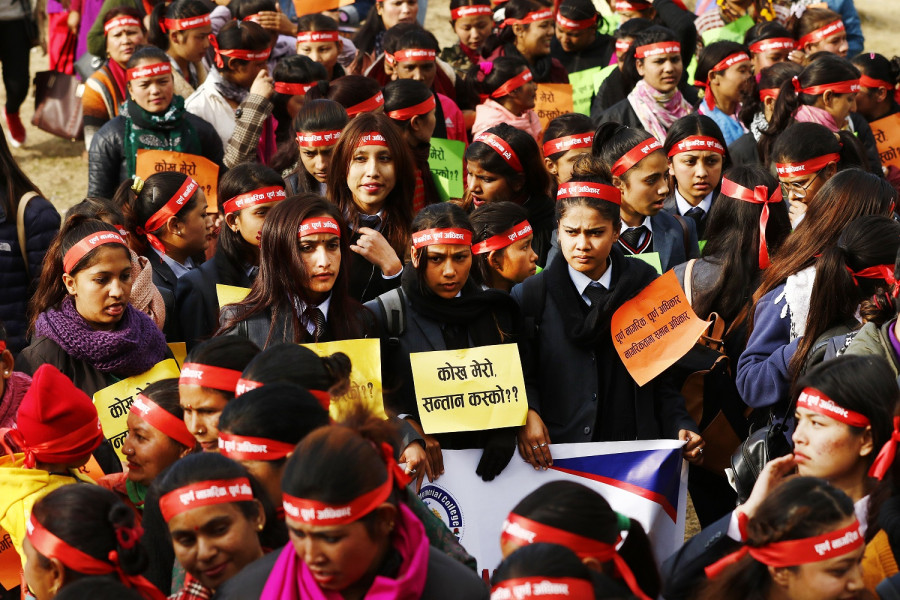Columns
Institutionalising discrimination
A society that treats its sons and daughters differently will never achieve prosperity.
Bina Jha
A few weeks ago, a large group of Nepali youths took to the streets to protest against government incompetence, corruption and lack of sensitivity in the Covid-19 response. The protest clearly showed their immense love and respect for the country. At the frontline of this protest, along with brave sons of the country, were also brave Nepali daughters for whom the government has brought forward a highly discriminatory citizenship bill. When the world is moving towards gender equality as the 21st century progresses, the government here looks quite comfortable to introduce discriminatory provisions.
But why are the intellectuals in society silent about this situation? Why are they okay with this injustice? Is it that daughters aren’t able to contribute to the nation's prosperity? The arguments presented by parliamentarians during discussions on this topic sound like the country is only for males. It seems to suggest that males alone are members of society, they alone love the country, and only they have the right to decide about the citizenship of the country.
Myopic vision
When discrimination between genders in society is decreasing, instead of promoting equality, the government is trying to deepen the unjust gendered divisions. As proposed in the bill, the foreign wife of a son receives naturalised citizenship seven years after marriage, but why is there uncertainty for the daughter who marries a foreign man? How and where did they see an incoming danger from the women? How can people at the policy-making level be so short-sighted and narrow-minded? Is there any research or investigation which states that the nation is in danger because of the daughters? If this discriminatory bill is passed, what needs of society will be fulfilled other than the promotion and construction of patriarchy?
The Constitution of Nepal has marked down women’s rights in Section 3, Article 38. The establishment of gender-based governance has been institutionalised in the 15th Plan. Yet, the new citizenship bill fails to include the sentiments of the constitution or the commitments made on the national and international stage regarding the elimination of gender-based discrimination.
It seems as if women have been deemed untrustworthy by the state for some reason. Yet, when we look at history, the international treaties signed and domestic laws passed that have been most damaging to Nepal and its sovereignty have been designed, signed and endorsed by men. It is better to analyse the past and see how many instances there are of women committing treason against the state. Even if past examples set an accurate tone for the future, this line of thinking would not lead to the current discriminatory design of the citizenship bill.
Not just that, if a Nepali man marries a foreigner then she instantly gets her national identity card which gives certainty to her economic and cultural rights, among others. After seven years of receiving the citizenship card, she also receives political rights. But if a Nepali woman marries a foreigner who stays in Nepal, why should he never get a citizenship card? He does not even get a national identity card. What is the reason behind establishing this discrimination between Nepali men and women?
This discrimination not only exists between one generation but continues to their children too. If a son marries a foreign woman, she will get naturalised citizenship after seven years, and that will make their children automatically descent citizens by birth, and they are eligible to pursue political or military careers. However, if a Nepali daughter marries a foreign man, her husband will never be eligible to become a citizen of Nepal even if they reside in the country throughout their lives; and their children will never be eligible for the same access to political and military careers.
The children will get naturalised citizenship due to which they will never be eligible to be candidates for state jobs in high positions such as president, prime minister, speaker of Parliament or chief of army staff. If discrimination was to be established from the policy level, what was the point of the 10-year Maoist war, which was touted as being for social transformation? Is it ethically correct for the people in the current government to support the institutionalisation of discrimination like this? But when politicians cite examples of other countries' misogynistic laws to justify their acts, there is barely any room left for a reasoned debate. It is really unfortunate that a democratic country follows such an undemocratic tilt.
Fear of being emasculated
Discrimination can never bring prosperity. Is the major fear of most politicians and those benefitting from this patriarchal structure that a situation where their capacities will be questioned will arise? If not, what is the reason that they are using do or die techniques to institutionalise discrimination?
All responsible citizens are well aware that a society that promotes discrimination will never achieve prosperity. They will not accept the discrimination between sons and daughters. They will definitely advise the government to stop selling the fake fear of potential national treason by women. The ruling party should clean its act and stop perpetuating discrimination.
***
What do you think?
Dear reader, we’d like to hear from you. We regularly publish letters to the editor on contemporary issues or direct responses to something the Post has recently published. Please send your letters to [email protected] with "Letter to the Editor" in the subject line. Please include your name, location, and a contact address so one of our editors can reach out to you.




 14.24°C Kathmandu
14.24°C Kathmandu















